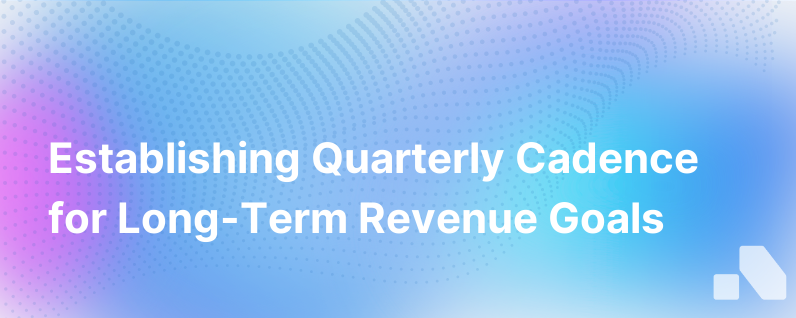
In the rapidly-evolving B2B marketplace, a strategic vision for revenue growth isn’t just important—it’s a prerequisite for continuity and success. Setting long-term revenue goals is fundamental, yet the pathway to achieving them is often marred by operational inefficiencies and a lack of structured follow-through. The answer? A robust, quarterly operating cadence.
A quarterly operating cadence acts as a heartbeat for your organization—pumping strategy, focus, and coordination through your teams to align actions with long-term objectives. Let’s drill down into how establishing a quarterly operating cadence can help your business set the stage for ongoing revenue accomplishment.
Understanding the Quarterly Operating Cadence
A quarterly operating cadence is a structured sequence of activities and meetings conducted every three months to review performance, align cross-functional team efforts, and set the agenda for the next quarter—making strategic adjustments as needed. It is a synchronized operation of reviewing achievements, learning, planning, and executing—the systemic check and balance on your progress toward your long-term revenue goals.
The Mechanics of a Quarterly Operating Cadence
At the core of a quarterly operating cadence are regular check-ins, review meetings, planning sessions, and reports. These components work together to ensure that everyone in the organization understands the goals and is working effectively to achieve them.
- Check-ins: Weekly or bi-weekly meetings to review progress on key actions, troubleshoot issues, and maintain alignment.
- Review Meetings: Monthly or quarterly sessions to evaluate what’s been achieved, discuss challenges, and share learning across teams.
- Planning Sessions: Day-long workshops to dive deeper into strategy, set objectives for the coming quarter, and allocate resources effectively.
- Reports: Regular updates on key revenue KPIs, milestones reached, and forecast adjustments.
Implementing a Quarterly Operating Cadence for Revenue Growth
Step 1: Lay the Strategic Foundation
Your long-term revenue goals must be clear, measurable, and understood across the organization. They should be rooted in detailed market analysis, customer insights, and competitive intelligence. Each department should know how their daily activities contribute to these goals.
Step 2: Break Down the Goals
Distill your long-term goals into manageable quarterly targets. This helps teams focus on immediate actions that make a bigger picture impact. These quarterly targets should be SMART: Specific, Measurable, Achievable, Relevant, and Time-bound.
Step 3: Synchronize Your Teams
Ensure that each team's efforts are orchestrated to support one another. Marketing campaigns need to feed into sales pipelines, and product development should align with the features and improvements customers are clambering for—all of which serves to boost revenue.
Step 4: Establish Review Protocols
Define how performance will be evaluated against set targets. Decide which metrics matter most. Aim for a data-driven assessment that objectively shows where you are in contrast to where you need to be.
Step 5: Foster a Culture of Transparency and Accountability
Openness about successes and failures is critical. Encourage teams to share both good news and bad, treating failures as learning opportunities. Recognize achievements to motivate staff and encourage a results-focused culture.
Step 6: Adapt and Iterate
Gather insights from each quarter to refine your approach. If certain tactics aren't working, pivot without hesitation. Your operating cadence should be nimble, allowing for strategic shifts that can lead to revenue growth.
Case Study: Quarterly Cadence in Action
A SaaS enterprise, 'TechGrow', used quarterly operating cadences to steer their long-term revenue strategy. They began by setting a three-year revenue goal, then broke that down into quarterly targets that spanned across sales, marketing, and product development.
During their check-ins, they discussed immediate blockers and wins, keeping a pulse on daily operations. The review meetings were more reflective, often bringing to light valuable insights—that their customer onboarding process, for example, needed revamping to drive product adoption and, ultimately, upsells.
The annual planning days allowed them to recalibrate not just for the next quarter, but to layout preliminaries for the following year.
Metrics Matter: The Numbers Behind the Cadence
Pay close attention to metrics like customer acquisition cost, lifetime value, churn rate, and customer satisfaction—each is a breadcrumb trail that leads back to your revenue outcomes. Regular reporting on these KPIs will help maintain focus and identify areas for improvement.
Scaling with Structure
As your business grows, scale your quarterly operating cadence accordingly. More staff and more complexity mean your cadence must evolve to maintain coordination and alignment.
Harnessing Tech for Efficiency
Advancements in technology, like CRM and analytics platforms, can streamline your cadence operations. Automated dashboards and alerts will keep everyone abreast of their performance relative to goals, while AI-driven predictive modelling can optimize your targeting and strategy in real-time.
Conclusion: A Rhythmic Path to Revenue Success
Long-term revenue goals aren't realised in a vacuum. They require the concerted effort of every department within your organization, pulsing to the beat of a well-structured operating cadence. By implementing a quarterly operational rhythm, your team can adapt, align, and advance towards your revenue objectives with strategic agility and precision—a formula for sustained growth through the quarters and beyond.
In the pursuit of such strategic excellence, an AI platform like Aomni can be a powerful ally, transforming complex data into actionable insights—ensuring that the next beat of your business's heart is as potent and productive as the last.